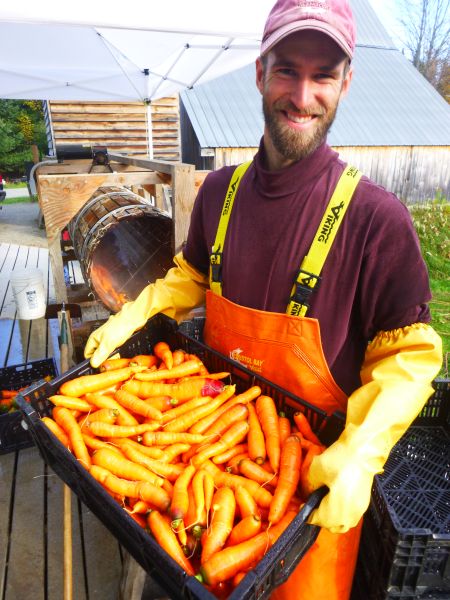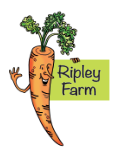It's harvest season on the farm! And there's a reason that from time immemorial, we humans have celebrated the harvests!
A pile of harvested veggies like carrots, beets, onions, squash, and more represents health and comfort for the winter, right? To me, it just feels good to see it there.
We may go to the grocery store for most of our food nowadays, but we haven't forgotten our roots as humans who rely on the earth's bounty for our health and sustenance.
And knowing where your food comes from is such a good feeling. Not to mention how good garden fresh tastes!
It looks like a great year on the storage veggie front on our farm!
Do you love fall harvested garden fresh taste but don't have time to do it all yourself?
We're here to help!
In fact, do you know what is the most common thing people say to us about our veggies?
“Your carrots are the best tasting carrots I've ever had!”
Three people said that on this past Wednesday alone. Want to try them for yourself? Read on for more info!

How to order bulk veggies from our farm?
Over the past 13 years we've done everything: several area farmers markets, Common Ground Fair, wholesale, started a CSA, held classes and open farm days, and more.
But now we've reached our dream of being primarily a Community Supported Agriculture farm. What does that mean? It's where we sell shares of the farm's veggies at the beginning of the season and then our members come to get their “shares of the harvest” through the season. It's the bread and butter of our farm business. It's how we support our family and our year-round employees who live and work in Piscataquis region.
If you're interested in the upcoming Winter CSA you can sign up here.
That being said, we DO have a way for you to buy veggies if you're not a CSA member (or buy extra if you already are a member!).
more info on preordering veggies
This is called preordering. Wondering the difference between preorder and CSA? I have a whole blog post on the difference between preordering and CSA and that can be found here.
The preorder list is where you can find our listings for bulk veggies. On good years, like this one (!), we are able to offer a variety of veggies in bulk for you to take home in the fall and store or process for the winter.
Or you can just order every two weeks fresh stuff! Whatever works for you.
Be sure to check out more info here be sure to sign up for the weekly (or biweekly email list). Our availability varies from week to week.
more info on preordering veggies
What veggies do you have available in the fall/winter?
We have many veggies available year-round! We don't just close up shop when our tomatoes and lettuce are gone! In fact the most common veggie that we have in general and in bulk are carrots!
And that's no coincidence, because it is the best tasting and most popular veggie we grow!
Here's a list of the veggies we grow in the fall and winter that you might see on the preorder list at any given time:
- carrots
- beets
- winter squash
- potatoes
- kale
- spinach
- baby lettuce
- lettuce
- daikon radish
- watermelon radish
- cabbage, green and red
- rutabaga
- parsnips
- onions, red and yellow
- garlic
- leeks
- and more
more info on preordering veggies
How to use 25 pounds of carrots?!
Now onto the fun part!
When people see 25 pounds of carrots their eyes widen.
“Wow,” they say, “what are you going to do with that many carrots?”
Here are some great ideas for you!
10 Delicious Ways To Enjoy The Best Tasting Carrots
This time of year is when the carrots taste at their absolute peak, so if you are building up your supply from the CSA or if you just want to get more of this beta carotene-rich golden sweetness into your life, this blog post is for you!
I'm sharing with you our favorite fun 10 ideas to use more of them!
#1 Roasted
This is our CSA members' favorite way to enjoy our farm's fresh carrots. Slice or keep them whole if baby sized and toss with salt and pepper as your most basic preparation, or optionally add garlic, dill or honey to change it up. Roast on a baking sheet at 400 degrees until tender. So, so, so sweet!
What to do with leftover roasted veggies?
- You can freeze them after you roast them too.
- Or puree them and use them as a soup base, as one CSA member does. Mmmm!
- Or make Roasted Carrot and Tomato Soup, found under 'Carrots' in our Vegetable Gallery. (You can use frozen or canned tomatoes for this!)
#2 Shredded or spiralized
Peel and shred carrots using a grater or if you're doing a lot, in the food processor or use a spiralizer. Put them into a lidded container in the fridge to have on hand and use as needed. Honestly this is a great way to use carrots at our house. I find that when I have them shredded and ready to go I add to them SO many things! Here are some ideas to get you started:
- Add to tacos.
- Add to salads.
- Or add them to slaw! Use in combination with cabbage, or alone…this is a great way to use those flavorful gems. Make a slaw ahead of time and it will keep for 3-5 days in the fridge. The Lemony Coleslaw found under 'Cabbage' is my latest obsession!
#3 Cut up with dip
Peel and cut up your carrots into sticks, ready for eating, and store them in the fridge in a lidded container.
I know at least one CSA member with kids who does this and her kids can just go and get carrot sticks whenever they need a snack. Good idea, right? Pair it up with a dip idea below, and I can guarantee you that your family will be eating more veggies!
- Make a homemade dip. Here is my tutorial on how to do it with recipe examples. I usually make a simple one and keep it in the fridge for quick snacking.
- Or even simpler, dip your precut carrot sticks into peanut butter or other nut butter. Mmmm! Surprisingly good, this get's snapped up quickly at our house.
#4 Fritters/veggie pancakes
This is a great way to use up extra veggies you may have in your fridge. You can use carrots alone or in combination with other veggies including, zucchini, beets, potatoes, kohlrabi, onions, cabbage, etc. etc. etc. for a great tasting veggie pancake. Here are exmaples of our family's favorites:
- Try Kohlrabi (and Carrot) Fritters, found under 'Kohlrabi'.
- Or make Vegetable Pancakes, our family's favorite, found under 'Cabbage'. Definitely make the sauce, too.
#5 Juiced
I will admit, this requires special equipment, and I often shy away from recommending recipes that do, but this one merits a mention. Carrot juice made with our sweet carrots is simply amazingly rich and if you already own a juicer, you have to try it! Juicing is a great way to get lots of nutrients from carrots without all the chewing!
And this is the month to do it! Farmer Gene bags up bulk bags of our seconds carrots, perfect for juicing enthusiasts. If this speaks to you, check out how to order them here.
#6 With grains
This is great option because you can enjoy now or later. Carrot muffins and bread freeze well, so if you don’t eat it — throw it in the freezer!
- Think carrot muffins,
- carrot bread,
- carrot cake,
- or even oatmeal as in this recipe that a CSA member shared this week in our CSA's private Facebook group.
#7 Hummus
Yes! A great way to increase your veggie consumption… Dip more veggies in more veggies! Hummus is so easy to make, don't be mystified and feel you need to buy it!
- Try this Carrot Hummus recipe found under 'Carrots'.
- Or simply buy/make a hummus and dip your carrot sticks into it!
#8 Freeze to enjoy later
If you're overloaded with carrots, the freezer can be a good choice. For freezing, you've got a couple of options:
- Blanch and freeze: Carrots can be cooked in boiling water for a few minutes, then put into an ice bath to cool and then thrown into a freezer bag for storage. Keep in your freezer for the next 8-12 months! Then pull them out for a simple and fast buttered carrot side dish with honey and parsley.
- Blanch, puree and freeze: Blanch and puree those carrots and you can use them for a simple “mashed carrot” dish with some butter and salt. Or use them as a first food for baby and pack them into an ice cube tray. It makes homemade baby food so easy!
#9 Preserve them by pickling or canning
Yes, you can pickle carrots just like cucumbers and cabbage. You can pickle them alone or add them to your sauerkraut of kimchi! Here are our favorite ways to ferment and quick pickle carrots:
- Curried Carrot Sticks (Lacto-feremented) found under 'Carrots'
- Ginger Carrots (Lacto-fermented) found under 'Carrots'
- Korean Cabbage Pickle (Kimchi) found under 'Cabbage'
- Or simply make refrigerator pickles aka quick pickles using this tutorial blog post.
- Or can them! Here's a great resource on how to can carrots safely.
These are all easy and yummy ways to use carrots. You'll be surprised at how fast they go… (!)
#10 Soup
Ahh, those of you who know me well, know that I just love soup. Its my favorite food. And carrots are my favorite veggie… So of course I had to save the best for last!!!
So with your carrots, make carrot soup! It's so easy, delicious, and a great way to use up extra carrots and/or get lots more veggies into your diet! You can even freeze your homemade soup for later!
It's so hard to pick, but here are a few of our family's favorite carrot soup recipes:
- Carrot Cilantro Soup found under 'Carrots'
- Carrot Ginger Soup found under 'Carrots'
- Curried Carrot Soup found under 'Carrots'
- Or even just throw them into a basic vegetable soup in combo with other winter veggies like potatoes, turnips, onions, garlic, cabbage, etc. Can't go wrong with garden fresh flavor!
What are "seconds" carrots?
Seconds carrots are carrots that have visual imperfections like a fork or a split or a twist or have been broken off in the harvest process. Or are very large or very small. Our seconds carrots store just like “firsts” carrots, as they do not have any soft or rotten spots on them.
But after all, they don't matter what they look like as they're all going to get eaten anyway, right?
How long can you store carrots and how do you store them?
You can store carrots for a very long period of time if you keep them at the right temperature and moisture content. Carrots want to be as close to 32 degrees as possible and moist, but not sopping wet, and they want to be able to breathe. That being said, it's not as easy for the home gardener without a large root cellar or fridge to keep a big quantity of carrots. We suggest keeping them in your cellar or garage if it's cooler than 40 degrees but warmer than freezing. Our bulk seconds carrots come in a perforated plastic bag which provides good moisture retention for the carrots.
more info on preordering veggies
